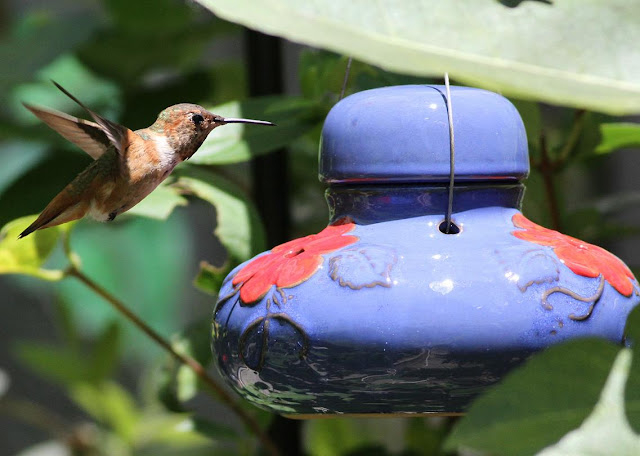On my latest trip to a local thrift store looking for
bird fountain parts, I found a beautiful hummingbird feeder that I have never
seen before and it appeared to be brand new! It is made out of ceramic and has three pretty flowers on the outside where there are holes for the hummingbirds to get
their sugar water. Here are some photos of the feeder and a very cute little
hummer that came to feed.
I hung the ceramic hummingbird feeder out last week to see
if it would be accepted by my resident hummers. Well it works just fine and it
was time for me to refill the feeder. Because it is ceramic, you can't see if it
is full or empty, so you have to guess or take it down and lift the top to check. Clean and refill at least once a
week to keep it mold free. Here is a shot of a cute little Allen's
Hummingbird hanging around the new feeder as I approach it to take it down for a
refill.
Top view of the feeder. You can see the high quality glaze
finish on this work of art.
The top comes off and there are three plastic coated wire
cables that come out of the feeder for easy hanging. The feeder is easy to clean and you fill it so the sugar
water goes almost up to the opening hole on the painted red flower. Put the top
back on and hang it up.
I've hung the ceramic feeder right outside of my kitchen
window. The white oval shows the feeder. The red circle in this photo shows the
Allen's Hummingbird waiting to feed at the new feeder.
There, all clean and filled with sugar water for the
hummers. The recipe for the sugar water is 1/4 cup of sugar (pure cane sugar only) to one cup of water.
Be sure to bring the water to a boil. The boiling of the sugar water kills the
mold found in the sugar that may cause a pox-like disease of the beak in
hummers. So always boil the water for about 2 minutes.
Same hummer but photo taken from a different angle.
Time to check out the feeder.
This is one advantage to getting a feeder that has no
perch, the hummers have to feed on the wing so you get more action shots.
The hole on the ceramic feeder is large enough for the
hummer to dip his beak all the way down. His tongue is almost as long as his
beak so there is no problem in getting to the sugar water. Great info by the Macaulay Library: "Hummingbirds tongue has two long grooves. Nectar moves up these grooves via capillary action. The bird them retracts its tongue and squeezes the nectar into its mouth."
This is the way hummers feed on real flowers. Only the man-made feeders provide
perches.This ceramic also has a smooth glazed finish around the openings as not to harm the delicate beak and tongue. Always check the plastic feeder openings for sharp jagged edges.
I am very happy with this beautiful thrift store find.
Checks me out to see that I don't get too close.
I think this is a young male but it's really hard to tell about
sub-adults.
You can see a little bit of his tongue.
Feeding again.
Close-up.
Such a cutie.
One last shot and I leave him to feed in peace. If anyone
finds one of these ceramic feeders, I highly recommend. They really do work as a
feeder and you have a beautiful piece of artwork.
Have a beautiful week everyone!






























Great find - love how it complements your stained glass!
ReplyDeleteThanks Nancy for your comment. Yes, I love my stained glass. Got that at the thrift store too!
ReplyDelete